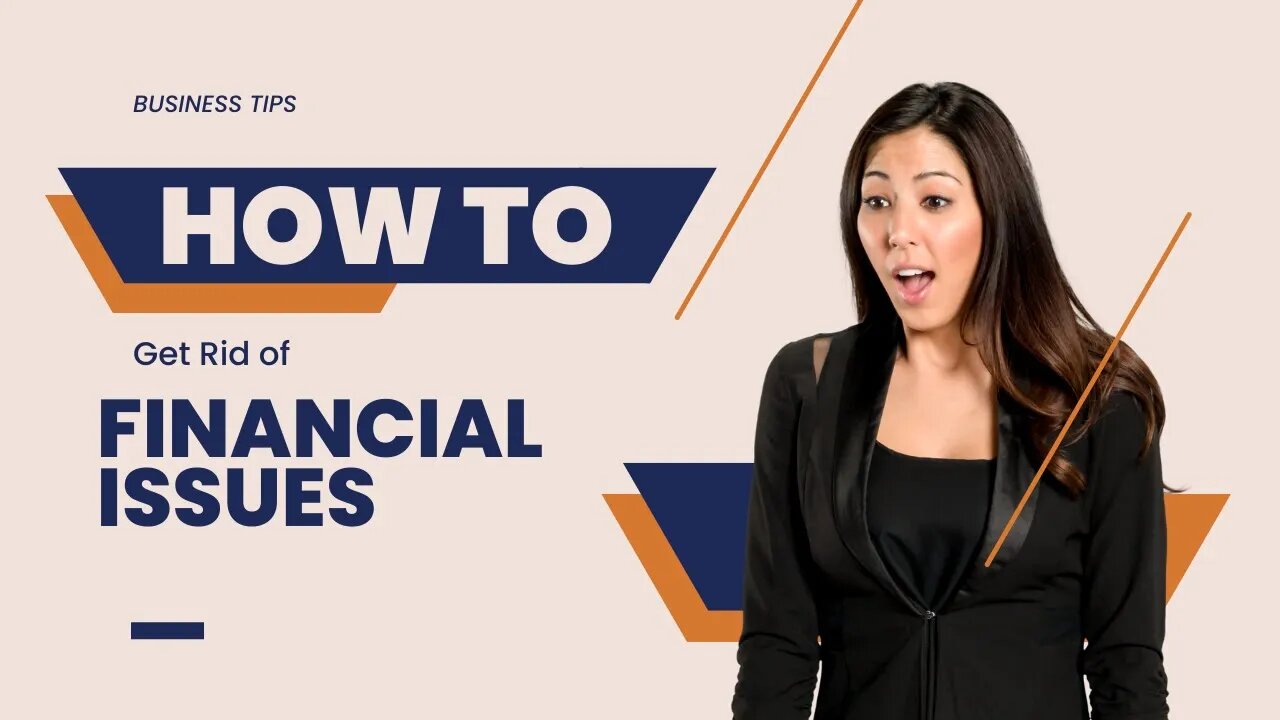Premium Only Content

How to Get Rid of Financial Issues
For many people, financial stress is a daily reality. Money troubles can lead to sleepless nights, arguments with loved ones, and even serious health problems. So what are the biggest sources of financial stress? A recent survey identified three major culprits: unexpected expenses, monthly bills, and debt. In this video, we’ll discuss how to get rid of financial issues.
Identify the sources of financial stress
Financial stress is not uncommon and can come from a variety of sources. Identifying the top sources of financial stress can help you to develop a plan to reduce or eliminate those stresses. For example, if you find that a large percentage of your financial stress comes from credit card debt, you may develop a plan to pay down your debt by making extra payments each month. Or, if you find that your job is the biggest source of financial stress, you may look for ways to reduce your expenses or increase your income. Whatever the source of your financial stress, identifying it is the first step toward finding relief. Once you know where your financial stress is coming from, you can begin to develop a plan to address it. With a little effort, you may be able to eliminate financial stress altogether.
Have a budget
Creating a budget can be a helpful way to get a handle on your finances. By taking a close look at your income and expenses, you can create a plan for spending and saving that aligns with your financial goals. A budget can also help you to track your progress over time and make adjustments as needed. Additionally, sticking to a budget can help to reduce stress and anxiety around money. If you are feeling overwhelmed by your finances, creating a budget may be a good place to start.
Distinguish between needs and wants
Everyone has needs and wants, but not all of them are essential for survival. Needs are things we must have in order to live, such as food and shelter. Wants are things that we would like to have, but they are not essential for survival. For example, you may need a car to get to work, but you may want a luxury car. You may need clothes to wear, but you may want designer clothes. It is important to strike a balance between needs and wants in order to achieve financial stability. Prioritizing your spending can help you make better decisions about how to use your money.
Have an emergency fund
One of the key components of a healthy financial strategy is an emergency fund. This is a sum of money set aside specifically for unexpected expenses, such as a job loss, medical bills, or car repairs. Having an emergency fund can help to reduce financial stress in the event of an unexpected setback, and it can also help you to avoid going into debt. Financial experts typically recommend saving 3-6 months of living expenses in an emergency fund, but even a smaller amount can be helpful in a pinch. If you don't have an emergency fund, now is the time to start building one.
Strategically address your debt
No one likes to be in debt, but sometimes it's unavoidable. If you find yourself in this situation, it's important to be strategic about how you handle it. First, take a look at your income and expenses to see where you can cut back. This will free up some extra cash that you can put towards your debt. Next, make a plan to attack the debt with the highest interest rate first. This will save you money in the long run. Finally, continue to make regular payments on all of your debts until they are paid off. By following these steps, you can get out of debt and start fresh.
Get help
There are many sources of financial help available for those in need. The first place to start is with family and friends. They may be able to help out with a loan or provide some other form of financial assistance. There are also a number of government programs that can offer financial help, such as food stamps and Medicaid. Charitable organizations are another potential source of help, and many churches offer financial assistance to those in need. Finally, there are a number of private organizations that offer financial assistance, such as credit counseling services and debt consolidation companies. Any of these options could be a good way to get the financial help you need.
-
 24:08
24:08
MYLUNCHBREAK CHANNEL PAGE
1 day agoUnder The Necropolis - Pt 4
212K51 -
 1:26:44
1:26:44
Tactical Advisor
22 hours agoTrump Starting Strong/Shot Show Recap | Vault Room Live Stream 015
110K9 -
 49:13
49:13
SGT Report
1 day agoGILDED CAGE: A.I. PRODUCED MRNA VACCINES & THE ROAD TO HELL -- Sam Anthony
54.6K377 -
 17:00
17:00
BIG NEM
13 hours agoI Spent 10 Years Making a Movie About a 40 Year Old VIRGIN
58 -
 17:01
17:01
RealitySurvival
9 hours agoRussia's Anti-Satellite Weapon Could Disable Your Commuter Car!
254 -
 4:13:39
4:13:39
Nobodies Gaming
16 hours ago $42.98 earnedNobodies : Rumble Gaming MARVEL RIVALS
244K12 -
 19:52
19:52
Adam Does Movies
13 hours ago $6.13 earnedEmilia Pérez Movie Review - It's Uniquely Awful
65.3K4 -
 20:07
20:07
BlackDiamondGunsandGear
19 hours agoSPRINGFIELD ECHELON COMPACT / NOT GOOD
58.7K4 -
 1:05:06
1:05:06
Man in America
20 hours agoThe Terrifying Truth Behind Chemical Fog, Wildfire Smoke & Chemtrails w/ Dr. Robert Young
63.2K165 -
 2:54:47
2:54:47
Tundra Tactical
13 hours ago $21.67 earnedSHOT Show 2025 Wrap Up!! On The Worlds Okayest Gun Live Stream
112K7